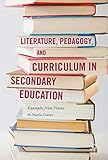Literature, Pedagogy, and Curriculum in Secondary Education [electronic resource] : Examples from France / by M. Martin Guiney.
Material type: TextPublisher: Cham : Springer International Publishing : Imprint: Palgrave Macmillan, 2017Description: X, 305 p. online resourceContent type: text Media type: computer Carrier type: online resourceISBN: 9783319521381Subject(s): Education | Curriculums (Courses of study) | Education -- Curricula | Literacy | Education | Early Childhood Education | Literacy | Curriculum StudiesAdditional physical formats: Printed edition:: No titleDDC classification: 372.21 LOC classification: LB1101-1139Online resources: e-book Full-text access
In:
Springer eBooksSummary: This book argues for the importance of literature studies using the historical debate between the disinterested disciplines ("art for art's sake") and utilitarian or productive disciplines. Foregoing the traditional argument that literature is a unique spiritual resource, as well as the utilitarian thought that literary pedagogy promotes skills that are relevant to a post-industrial economy, Guiney suggests that literary pedagogy must enable mutual access between the classroom and the outside world. It must recognize the need for every human being to become a conscious producer of culture rather than a consumer, through an active process of literary reading and writing. Using the history of French curricular reforms as a case study for his analysis, Guiney provides a contextualized redefinition of literature's social value.
TextPublisher: Cham : Springer International Publishing : Imprint: Palgrave Macmillan, 2017Description: X, 305 p. online resourceContent type: text Media type: computer Carrier type: online resourceISBN: 9783319521381Subject(s): Education | Curriculums (Courses of study) | Education -- Curricula | Literacy | Education | Early Childhood Education | Literacy | Curriculum StudiesAdditional physical formats: Printed edition:: No titleDDC classification: 372.21 LOC classification: LB1101-1139Online resources: e-book Full-text access
In:
Springer eBooksSummary: This book argues for the importance of literature studies using the historical debate between the disinterested disciplines ("art for art's sake") and utilitarian or productive disciplines. Foregoing the traditional argument that literature is a unique spiritual resource, as well as the utilitarian thought that literary pedagogy promotes skills that are relevant to a post-industrial economy, Guiney suggests that literary pedagogy must enable mutual access between the classroom and the outside world. It must recognize the need for every human being to become a conscious producer of culture rather than a consumer, through an active process of literary reading and writing. Using the history of French curricular reforms as a case study for his analysis, Guiney provides a contextualized redefinition of literature's social value.
| Item type | Current library | Collection | Call number | Copy number | Status | Notes | Date due | Barcode |
|---|---|---|---|---|---|---|---|---|
| E-Books | MEF eKitap Kütüphanesi | Springer Nature | LB1101 -1139 (Browse shelf (Opens below)) | Available | NATURE | 1419756-1001 |
This book argues for the importance of literature studies using the historical debate between the disinterested disciplines ("art for art's sake") and utilitarian or productive disciplines. Foregoing the traditional argument that literature is a unique spiritual resource, as well as the utilitarian thought that literary pedagogy promotes skills that are relevant to a post-industrial economy, Guiney suggests that literary pedagogy must enable mutual access between the classroom and the outside world. It must recognize the need for every human being to become a conscious producer of culture rather than a consumer, through an active process of literary reading and writing. Using the history of French curricular reforms as a case study for his analysis, Guiney provides a contextualized redefinition of literature's social value.
5
